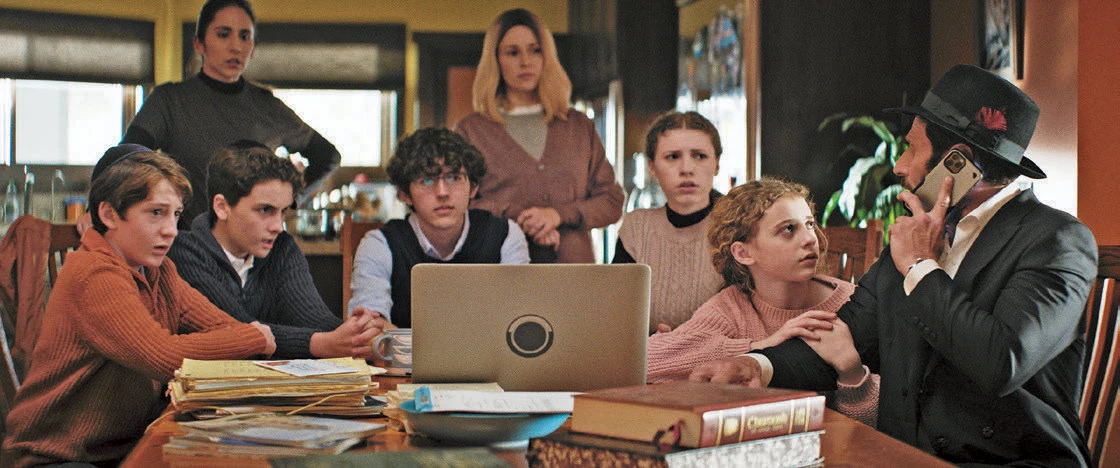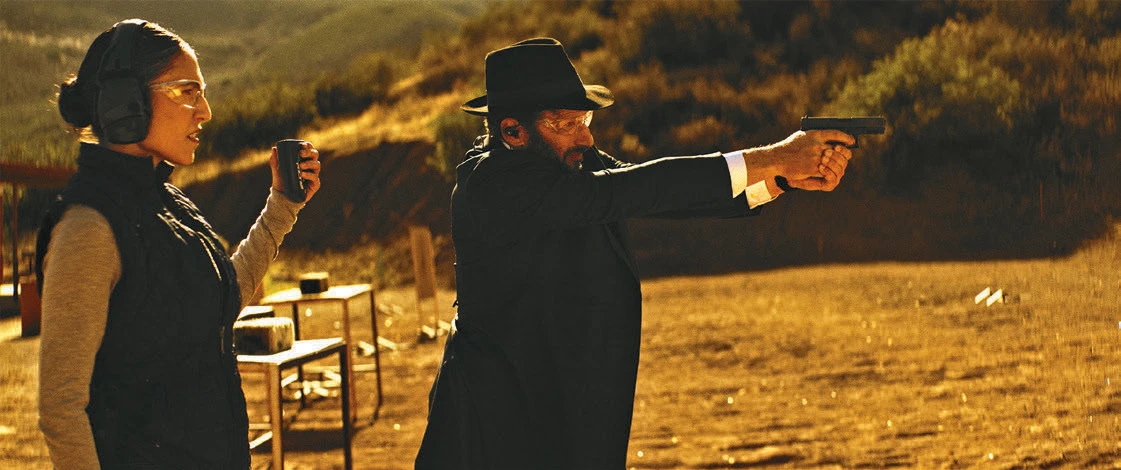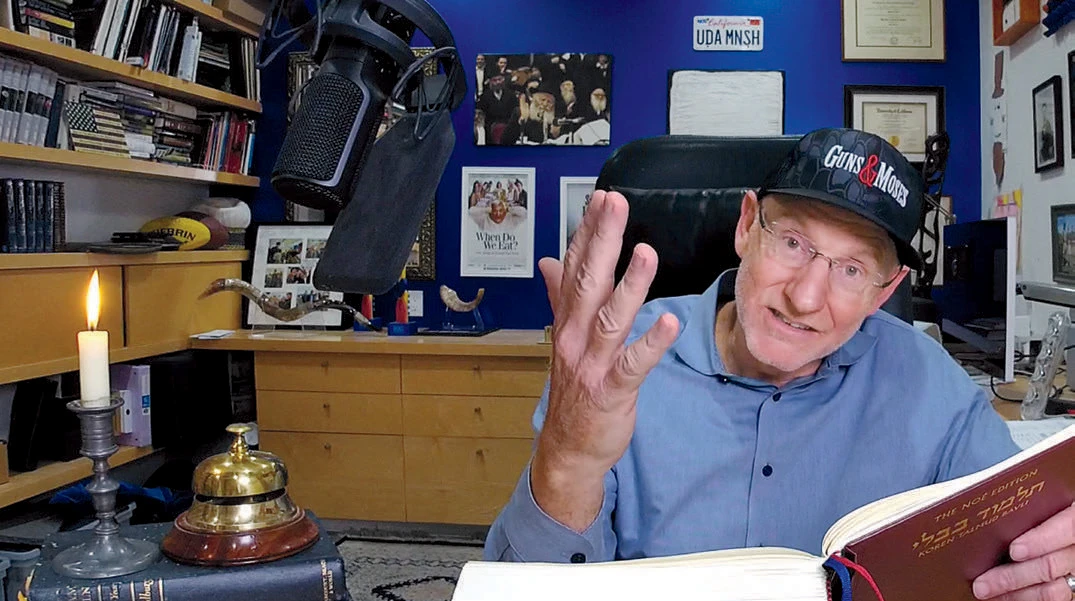Among a sea of black hats, Salvador Alexander Litvak ’87 sported a white fedora. His color palette was not the only thing setting him apart from the 92,000 revelers at New Jersey’s MetLife Stadium who gathered in August 2012 to celebrate Jewish text study. Most there grew up attending yeshivas (Orthodox religious schooling), while Litvak was raised fairly secularly. He had a bar mitzvah and heard about the Holocaust from his mother and grandmother, who both survived the Theresienstadt concentration camp. He was always interested in God, but instead sought divine connection through martial arts, heavyweight crew, transcendental meditation, Afro-Cuban drumming, and Grateful Dead shows.
It was not until his grandmother died in 1997 that Litvak embraced Judaism. He started attending services, classes, and lectures of various Los Angeles rabbis, who continually referenced the Talmud, a series of texts containing Judaism’s religious laws and associated scholarly debates. In 2005, Litvak walked into a Jewish bookstore and finally picked up the first book of the Talmud. The cashier was shocked to learn that he had never heard of Daf Yomi, the seven-and-a-half-year cycle of daily text study, which, by coincidence, was beginning anew that very day.
At that moment, Litvak became the “Accidental Talmudist.” Now, under that title, he shares kernels of Jewish wisdom and humor with his one million social media followers. Alongside his wife, he directs films that paint positive portrayals of faith, including the forthcoming Western thriller Guns and Moses.
As a child, Litvak never imagined making films. He was born in Santiago, Chile, where his mother and grandmother emigrated after the Holocaust. (His paternal great-grandfather had fled Ukraine for Chile a generation prior.) When Litvak was five, his family moved to New York City. His parents wanted him to “go to Harvard and be a doctor,” he recalls. But his vision for life diverged from his parents’. He studied English and then, at New York University law school (another step his parents encouraged), he immersed himself in the city’s arts scene. During a post-graduation stint at a law firm, he preferred watching movies in his office to doing legal work. So, he headed to film school at the University of California, Los Angeles, hoping to become a director.
Litvak’s first professional directing foray was foiled by poor timing. He and his wife, screenwriter Nina Davidovich Litvak (the two met in L.A.), spent two years crafting a script about Abraham Lincoln, only to be scooped by the announcement of Steven Spielberg’s film Lincoln, based on a biography by Doris Kearns Goodwin, Ph.D. ’68. (The Litvaks would eventually release their film Saving Lincoln in 2013.)
Searching for a simpler concept, Litvak turned to Judaism. He paged through the Szyk Haggadah his great-grandfather gave him, full of vibrant Passover illustrations, and imagined a Passover Seder gone horribly wrong. In the film that emerged, When Do We Eat?, one son in a Jewish family embraces Hasidic Judaism, and his mother transforms their usually lax Seder into a kosher affair. Havoc ensues.
The movie is full of slapstick humor, but Litvak wanted to convey something deeper, too. “It was a movie that shows that Jews, like anyone else, can behave quite badly,” he says. But it also showed “that Judaism has something to offer anyone in their dysfunction.” The movie features genuine displays of faith—from traditional songs and explanations of rituals to a meaningful examination of Holocaust trauma. In the end, Jewish traditions help the family come together.
But reviewers did not see the film that way. The Washington Post wrote, “If its makers weren’t all Jewish, it would be considered antisemitic.” The New York Times said, “This film has nothing but contempt for what some people hold sacred.” Litvak and his wife were shocked. “We underestimated the antipathy…for a sincere expression of faith,” he says. If a filmmaker shows “how hypocritical and irrelevant and outdated religion is, then you’re a hero. But if you have something positive to say…then that’s somehow dangerous.”
Litvak thought he had failed to make “the Jewish It’s A Wonderful Life.” But in the decades since, When Do We Eat? has attracted a devoted group of fans who watch it every Passover season. “Not so many movies generate that kind of love 20 years later,” he says.
Though Litvak is a filmmaker, his most notable work takes place on smaller screens. In 2012, he started the “Accidental Talmudist” Facebook page to promote his Jewish Journal column by the same name. Thirteen years later, more than a million people follow him on Facebook and Instagram, where he shares Jewish humor and wisdom. “I wasn’t exposed to inspiring Judaism when I was young, and the tradition is so rich,” he says. “No matter who you are…there’s a part of Torah and Judaism that will speak to you.” In 2024, he compiled his favorite Jewish humor into a book called Let My People Laugh. He supports himself financially through the affiliated Accidental Talmudist nonprofit, among other ventures.

That online community is central to Litvak’s forthcoming third feature film. In 2019, a white supremacist attacked a synagogue in Poway, California, during Passover prayers, killing one worshipper and injuring three others, including the rabbi. Through his Accidental Talmudist work, Litvak got to know the rabbi and his community after the attack. “I thought, there’s something in this,” Litvak said. In Guns and Moses, an Orthodox rabbi in a small California desert town takes up arms when white supremacists threaten his community.
Litvak does not describe the movie as political. He says it touches on “Second Amendment values” and the idea of “a man of faith who wears his faith proudly.” (Though Guns and Moses was filmed before the October 2023 Hamas terrorist attack in Israel and the ensuing war in the Middle East, it will be released this summer in a changed political context.) But the film’s marketing might have a political tinge. In early screen tests, politically conservative religious Christians expressed excitement. That did not surprise Litvak—he says many Christians follow his Accidental Talmudist account, interested in his Old Testament teachings. He hopes Guns and Moses can reach a conservative audience hungry for relatable movies.

These days, the Accidental Talmudist account includes film promotion, but it is also a microcosm of the big-tent Judaism Litvak sought in his youth. In one post, he stands on his front porch, telling a joke about the first Jewish president and his mother. A few days later, he appears in full prayer garb—tallit and tefillin—offering a prayer for the safe return of Israeli hostages. And most evenings, he livestreams himself teaching Talmud.

Litvak once spurned Judaism, thinking faith was a boring chore. But he now realizes that Judaism offers “something for everyone to learn from.” People curious about Judaism may relate to Litvak’s journey—and enjoy learning from an “artsy misfit” who prefers a summer-weight Panama fedora to the traditional black Orthodox garb.









